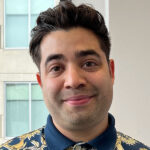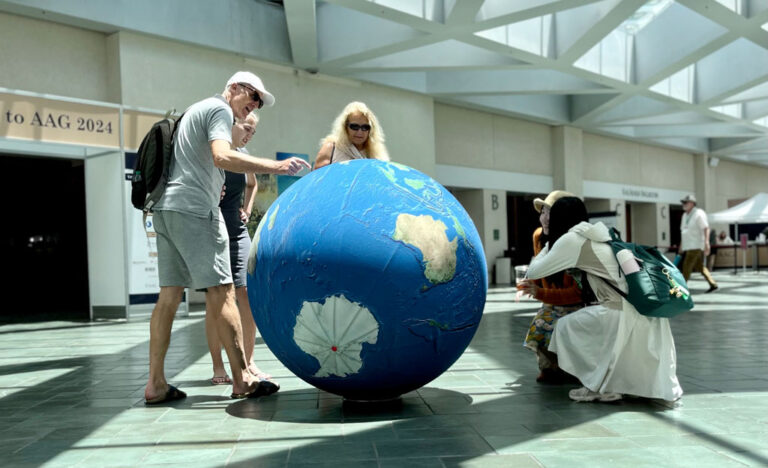Member Profile: Mark Ortiz

 Mark Ortiz was almost finished with his bachelor’s degree at the University of Alabama, doing a self-designed major in environmental studies, when he realized that geography offered him the space to study nature and society in connection with one another. “I started reading work in critical geography and political ecology and felt that it was a natural fit where I could pursue the intersectional questions that interested me,” he says. He went on to earn his master’s and Ph.D. in geography from UNC-Chapel Hill.
Mark Ortiz was almost finished with his bachelor’s degree at the University of Alabama, doing a self-designed major in environmental studies, when he realized that geography offered him the space to study nature and society in connection with one another. “I started reading work in critical geography and political ecology and felt that it was a natural fit where I could pursue the intersectional questions that interested me,” he says. He went on to earn his master’s and Ph.D. in geography from UNC-Chapel Hill.
Now, as a Presidential Postdoctoral Scholar in the Penn State Department of Geography, and an incoming assistant professor there, he focuses on transnational youth movements, the global politics of climate change, and youth popular and social media cultures. He also challenges himself to translate his knowledge to action, engaging students and community members in his work, serving with numerous youth and intergenerational climate justice organizations, and being an expert panelist and consultant on youth empowerment for international organizations such as IDEO and the U.N. Foundation, as well as a delegate to U.N. climate change and sustainable development meetings around the world.
“What I’ve been really impressed by with the youth movement and the young folks that I’ve worked with is that there’s a real spirit of building across traditional boundaries, boundaries that they’ve kind of inherited from older decision makers or adults and really trying to build new alliances and solidarities, which I think is really important.”
— Mark Ortiz
Ortiz has also observed that young climate activists and scientists have a shared goal: to translate scientific findings into creative demonstrations that engage the public and illustrate what’s at stake. Ortiz sees his role, among others, as helping more people to access, interpret, and understand what is happening to the Earth’s climate, and to help “create imaginative knowledge products” such as stories, multimedia, and more.
“I am interested in dismantling the barriers that I feel separate the university — the “Ivory Tower” version of it — from our communities,” he says. In research and practice, he pushes at those barriers, which “often result in uneven and extractive relationships that benefit the university but have limited tangible benefits for communities.” He feels a sense of responsibility to make his work more legible to broader audiences, and to create stories with the young people whose activism he studies.
He was drawn to apply for Elevate the Discipline to advance his work in finding new approaches to storytelling that will better represent the global diversity of voices in contemporary youth climate activism. Recently, Ortiz’s vision resulted in the Penn State announcement of a landmark initiative, which he created and directs: The Global Youth Storytelling Initiative. The initiative will be carried out in collaboration with students Rasha Elwakil (undergraduate) and Timothy Benally (master’s student), as well as a Youth Advisory Board and Intergenerational Council.
Ortiz’s leadership style draws on the lessons he has learned as a community organizer, as well as the principles of feminist care ethics and the movement for “slow scholarship.” He sees himself as an introverted person with a deep interest in community and coalition-building. Far from being at odds, these two elements of his nature bring together his special attribute as both scholar and collaborator. “My calling and my approach are grounded in listening and bridging. I think I have an ability to facilitate unlikely alliances and to slow down discussions, to avoid and deconstruct assumptions and build slower, more deliberate partnerships.” He believes that higher education institutions must invest in such a slowing down if they are to have the credibility to engage in community-based work.

“One of my mentors always talks about things moving at the speed of trust rather than the speed of tenure,” he says. “That means thinking about partnerships differently and stepping back from the framework of speed.”
Ortiz has been excited at how the Elevate program has helped him to build his network of mentors and collaborators across the discipline. “Already I’ve met people in the cohort who have been supporters and offered advice and guidance in various ways. I’m interested in paying this forward to as the Elevate program continues.”
“As critical human geographers, we’ve always had a different approach to science.” he says. He sees geography as an inherently vital, interdisciplinary space of inquiry for the many actors and interconnected questions of climate response, human rights and needs, and solutions that are equitable and just. “My graduate training as a geographer included classes in climate science, law and policy, social movement studies, and critical youth geographies frameworks, all of which have equipped me with conceptual tools to speak with a wide variety of potential collaborators across a range of disciplines.”
“I notice that a lot of disciplines are beginning to pick up language that has long been used by geographers, especially critical human geographers. This creates a real opportunity for geography to be at the leading edge of efforts to define and act on climate and society questions and issues.”
This article is part of a series of Member Profiles focused on AAG Elevate the Discipline scholars. Elevate the Discipline is an annual program that provides training opportunities and resources to help geographers connect their work to public and policy arenas. Find out more about Elevate the Discipline.


